SAFE SPACE
by Mel Ohlinger
Theodicy is the attempt to understand how we live in a meaningful cosmos when good people suffer and evil people prosper. If there is a God, why does God allow evil to exist? And if there is no God, then where does goodness come from?
After experiencing major trauma in my own life, I needed answers. I needed to know: why do bad things happen to good people? More urgently, why do bad things happen to children? How could anyone deliberately hurt and manipulate the most innocent among us? Where does this evil come from, and how do you go on living with the knowledge that such pain exists?
I explored many philosophies that felt hollow until I encountered something that finally gave me comfort: the Augustinian theodicy. According to this view, God’s goodness remains perfect and is not the cause of evil. Evil itself does not exist—it is simply a corruption of goodness, an absence of it. Just as cold is not a thing but the absence of heat, so too is evil the absence of good.
This explanation made sense to me, but it was also hard to accept. Was I to believe that children suffered because they lacked goodness? That couldn’t be right. To understand further, my professor encouraged me to read Dostoevsky’s The Brothers Karamazov. Three months later, I could see how human beings can be inherently good even while surrounded by suffering—but I still had no clear answer.
I turned to the Laocoön, Plato, Aristotle, and Judeo-Christian teachings, but still no explanation satisfied me. Finally, at the end of the semester, I pressed my professor again. His answer was simple: perhaps the lack of an answer is the answer. Bad things happen to good people. Sometimes, there is no purpose, no deeper meaning. Life is filled with tragedies that our hearts and minds cannot reconcile.
What we can do, however, is create beauty from the brokenness. For me, that meant taking an ugly painting and transforming it—making it beautiful, as an act of love.

